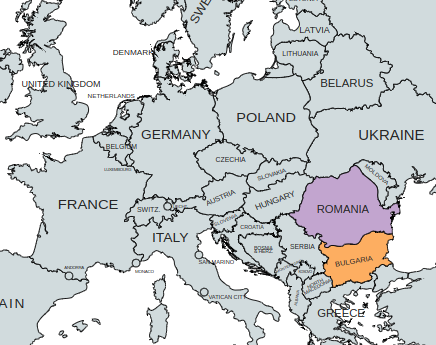Bulgarian and Romanian: A language comparison
Romanian is a Romance language — it evolved from Latin. Not everyone knows this, which explains why the Romanian language is sometimes referred to as “the forgotten Romance language”.
Just because Romanian is a Romance language does not mean that it has nothing in common with Slavic languages such as Bulgarian.
Situated in Eastern Europe, Romania is nearly surrounded by Slavic-speaking countries — its direct neighbors include not only Bulgaria but also Serbia and Ukraine. This has led the Romanian language to assimilate some Slavic vocabulary words.

Similar vocabulary words between Bulgarian and Romanian
Although a majority of Romanian vocabulary words can be traced back to Latin, there is still a sizable fraction of Romanian words which have a Slavic origin. It is estimated that approximately 10% to 20% of Romanian vocabulary words are of Slavic origin.
This is the reason why there are some similar vocabulary words between Bulgarian and Romanian.
| Bulgarian | Romanian | English |
|---|---|---|
| да (da) | da | yes |
| приятел (priyatel) | prieten | friend |
| богат (bogat) | bogat | rich |
| скъп (skup) | scump | expensive |
| лаком (lakom) | lacom | greedy |
| морков (morkov) | morcov | carrot |
| вина (vina) | vină | guilt |
| готов (gotov) | gata | ready |
| майка (maika) | maică | mother |
| гол (gol) | gol | naked |
| глезен (glezen) | gleznă | ankle |
| рана (rana) | răni | wound |
Bulgarian and Romanian use different alphabets. Bulgarian uses a Cyrillic alphabet whereas Romanian is written with a Latin alphabet. However, before the mid-19th century, Romanian was written with a Cyrillic alphabet.
Below are some more examples of similar vocabulary words between Bulgarian and Romanian:
- The Bulgarian word « мъка » (mŭka) has the same origin as the Romanian word « muncă ». The former means “grief” while the latter means “work”.
- The Bulgarian word « работа » (rabota) has the same origin as the Romanian word « robotă ». However, the former means “work” and the latter means “drudgery”.
- The Bulgarian word « невяста » (nevyasta) comes from the same origin as the Romanian word « nevastă ». The former means “bride” while the latter means “wife”.
- The Bulgarian word « буря » (burya) comes from the same origin as the Romanian word « bură ». The former means “storm” while the latter means “drizzle”.
- The Bulgarian word « улица » (ulitsa) and the Romanian word « uliță » are similar. They have the same origin and they both mean “street”.
- The Bulgarian word « весел » (vesel) means “cheerful”. That word has the same origin as the Romanian word « vesel » which means “glad”.
- The Bulgarian word « храна » (khrana) and the Romanian word « hrană » both have the same origin and they both mean “food”.
- The Bulgarian word « мъдър » (mŭdŭr) has the same origin as the Romanian word « mândru ». However, the former means “wise” and the latter means “proud”.
- The Bulgarian word « вражда » (vrazhda) and the Romanian word « vrajbă » are similar. They have the same origin and they both mean “animosity”.
- The Bulgarian word « граница » (granitsa) and the Romanian word « graniță » are similar. These two words have the same Slavic origin and they both mean “border”.
- The Bulgarian word « глас » (glas) and the Romanian word « glas » are similar. These two words have the same Slavic origin and they both mean “voice”.
- The Bulgarian word « ученик » (uchenik) comes from the same origin as the Romanian word « ucenic ». The former means “student” while the latter means “disciple”.
Romanian and Bulgarian: which one is the easier language for English speakers to learn?
The foreign service Institute based on its experience of teaching languages to diplomats has established a classification of languages in terms of their learning difficulty for English speakers.
Romanian is classified as a category 1 language. That is the category of languages that are most similar to English, and hence the easiest for English speakers to learn.
Bulgarian is classified as a category 3 language. That is the category of “hard languages” which present significant linguistic differences compared to English.
Based on this classification, it is estimated to take nearly twice as many hours of study to learn Bulgarian as it does to learn Romanian.
To summarize, Romanian is among the easiest languages for English speakers to learn, whereas Bulgarian is a Slavic language and those are typically ranked among the most difficult languages for English speakers to learn.
ConclusionBulgaria and Romania are neighboring countries, with Romania located just north of Bulgaria. Despite this geographical proximity, Bulgarian and Romanian are very different languages which are not at all mutually intelligible. Bulgarian is also a much harder language to learn than Romanian.
As a Romance language, Romanian is closer to other Romance languages (such as Italian and French) than it is to Bulgarian. See for instance this comparison of Romanian and Italian.
Because the Romanian language has absorbed some Slavic words into its vocabulary, there are some similar vocabulary words between Romanian and Bulgarian.
For more on the Romanian language, see this list of the 1000 most common Romanian vocabulary words.
Links